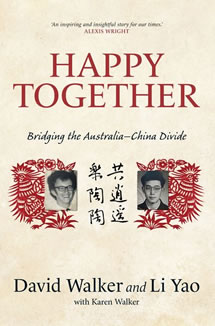Reviewed by Rama Gaind.
By David Walker and Li Yao with Karen Walker, Melbourne University Press, $34.99.
 The title says it all. Australian historian David Walker and Li Yao, a Chinese expert on Australia, have interwoven their joint memoir into a motivating and astute story of our times.
The title says it all. Australian historian David Walker and Li Yao, a Chinese expert on Australia, have interwoven their joint memoir into a motivating and astute story of our times.
Li Yao grew up in Mao’s China. Born into a pioneering family, he dreamt of becoming a writer, but his dreams were torn apart by the Cultural Revolution. When the storm finally subsided, the young man turned to translation. In Australian writing, he found colourful tales set in new landscapes, a literature quite unfamiliar to him.
Li Yao’s story is interwoven with that of his friend, David Walker whose family had also settled in an unfamiliar and difficult land, a world away in distant South Australia. The two men became friends as Li Yao translated one of David’s books into Chinese. We get a captivating glimpse into their personal histories by looking through an illuminating window into life in China, an experience inevitably shaped by China’s relations with the wider world. It’s a fascinating insight.
Karen Walker is a research scientist and academic, who also contributes to this enlightening chronicle.
Recollections are explicit: there are “profound differences in how Chinese and Westerners see the world. “
Just as we see what we want to see, we often only hear what we want to hear. On their long train journeys together, David and Li Yao discuss how certain phrases in Not Dark Yet were best translated. “Different understandings often emerged. In Australia, the bush was a nurturing place, an escape from the artificiality and pressure of city living. While the Chinese still see the countryside as a place of exile and punishment, Australians retreat to the bush in search of relaxation and spiritual renewal. Chinese are more likely to find solace among gardens, many of which are now open to all, not just the elite. Chinese people also like the warm feeling of being among others in their big cities. Australians often prefer to wander alone along a beach or in the bush.”
Li Yao has translated several Aboriginal writers, raising the question of how best to translate the word ‘country’ as used by Indigenous peoples? The indigenous idea of ‘Country’ is very different from the Chinese idea of ‘the countryside’.



